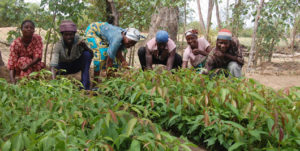

 A study by the Innovations for Sustainable Rural Development (ISRuDev) has revealed that improved access to farmland significantly enhances women’s income levels, food security, and household livelihoods in rural communities.
A study by the Innovations for Sustainable Rural Development (ISRuDev) has revealed that improved access to farmland significantly enhances women’s income levels, food security, and household livelihoods in rural communities.
The assessment found that women with better access to farmland recorded higher productivity and income gains compared to those without secured land.
It estimated an average income gain of GH¢160.46 among respondents with farmland access, with 91.2 per cent describing farmland access as a vital safety net and 85.3 per cent linking it to improved livelihoods and financial stability.
Presenting the findings at a Land Tenure Dialogue and Business Forum in Wechiau in the Wa West District at the weekend, Mr Paul Nayaga, the Co-consultant, said though women contributed significantly to food production in Ghana, they continued to face systemic barriers to land access.
The study was conducted among 150 women farmers drawn from ISRuDev’s three operational communities, Chogsia, Meteu, and Tendoma, to assess women’s access and tenure security over farmland and its contribution to their income levels.
The study showed that 69.2 per cent of the participants had their farmlands allocated by their husbands or partners, while only 21 per cent were legally recognised as land rights holders.
Also, 91.8 per cent of respondents lacked formal documentation, while 83.6 per cent enjoyed local recognition of their land rights.
Despite those challenges, 93.3 per cent of the respondents perceived their landholding as indefinite, and 78 per cent reported having the right to transfer or bequeath land, which indicated a relatively high level of perceived tenure security.
“Most women are smallholder farmers, cultivating 1–3 acres (average 2.37 acres) with 44.7 per cent increasing their cultivated area since joining ISRuDev”, Mr Nayaga noted.
The report, however, identified persistent challenges, including limited land sizes, insecure tenure, and inadequate resources, which restricted women from fully benefiting from their farmlands.
The study recommended intensified advocacy for women’s land rights and gender equity in land governance systems through community sensitisation targeting traditional authorities and family heads.
It also encouraged value addition and agribusiness training for women to improve their market competitiveness.
In a presentation, Mr Maxwell Kpetaa, the Business Development Officer at ISRuDev, indicated that the organisation worked in four thematic areas towards enhancing the livelihoods of its operational communities.
They were Livelihoods and Food Security; Environment and Ecosystems; Gender and Social Inclusion; and Maternal and Child Health.
Mr Richard Wulo, the Wa West District Chief Executive, called for deliberate and practical measures to address women’s limited access to productive lands.
He commended ISRuDev for the intervention on women’s access to productive farmlands and urged the promotion of gender-sensitive land administration policies that guaranteed joint ownership and inheritance rights for women.
Mr Issahaku Razack Abdulai Yamusah, the representative of the Paramount Chief of Wechiau, appealed to men to release farmlands to women as the proceeds from women’s farms contributed to their family’s welfare.
Source: GNA
The post Study finds women’s access to farmland improves income and livelihoods appeared first on Ghana Business News.
Read Full Story






















Facebook
Twitter
Pinterest
Instagram
Google+
YouTube
LinkedIn
RSS